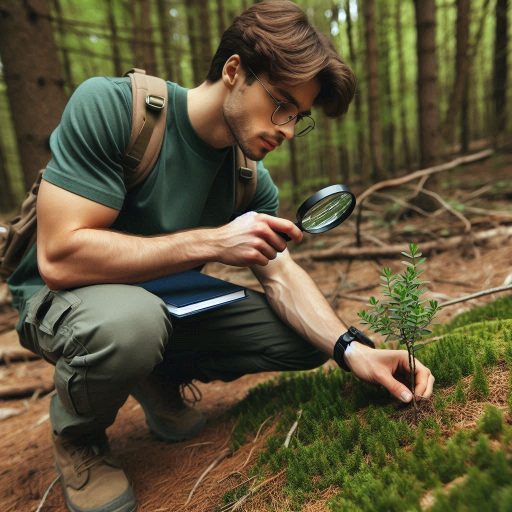Introduction
Networking plays a crucial role for aspiring ecologists and researchers.
Building a strong professional network enhances career opportunities in this competitive field.
The ecology sector presents unique challenges, such as limited job openings and a need for specialized skills.
Many individuals struggle to secure positions and gain exposure to vital experiences.
Networking helps overcome these challenges by connecting you with professionals, mentors, and like-minded peers.
These connections provide valuable insights, resources, and potential job leads that can propel your career forward.
Moreover, networking fosters collaboration and knowledge exchange, which are essential in the ever-evolving field of ecology.
Engaging with others allows you to stay informed about industry trends, best practices, and emerging research.
In this blog post, we will explore key networking tips tailored specifically for aspiring ecologists and researchers.
We will discuss the importance of volunteering for relevant causes, engaging in community events, leveraging social media, and building meaningful relationships.
By implementing these strategies, you can effectively expand your professional network and enhance your prospects in the ecology field.
Attend conferences and workshops
Attending conferences and workshops is vital for aspiring ecologists and researchers.
These events provide excellent opportunities to connect with professionals in your field.
Engaging with industry leaders can open doors to collaborations, mentorships, and job opportunities.
Importance of Attending Industry-Specific Events to Connect with Professionals in the Field
Conferences and workshops allow you to learn about the latest research and trends in ecology.
They often feature presentations from leading experts, giving you valuable insights into emerging topics.
Participating in discussions can deepen your understanding of pressing ecological issues.
Moreover, these events attract a diverse group of professionals.
You can meet researchers, policymakers, and educators passionate about ecology.
Networking with these individuals can lead to meaningful connections and potential career advancements.
Attending workshops can also enhance your skill set.
Many offer hands-on training in essential techniques and tools used in ecological research.
Gaining practical experience can make you more marketable to potential employers.
Tips on How to Effectively Network at Conferences and Workshops
To make the most of these networking opportunities, prepare in advance.
Research the event and create a list of attendees or speakers you want to meet.
Familiarize yourself with their work to engage in meaningful conversations.
Practice your elevator pitch before attending.
This brief introduction should summarize who you are and what you do.
Tailor your pitch to highlight your passion for ecology and your specific interests.
During the event, approach individuals with confidence.
Start conversations with a warm greeting and a genuine compliment about their work.
Ask open-ended questions to encourage dialogue and show your interest in their research.
Use social media to enhance your networking efforts.
Many conferences have dedicated hashtags, allowing you to engage with other attendees online.
Share insights from the event and tag relevant individuals to foster connections.
Ways to Follow Up with Contacts Made at These Events
Following up with new contacts is essential for maintaining relationships.
After the event, send a personalized email to thank them for their time.
Mention specific details from your conversation to remind them who you are.
Consider connecting on professional networking platforms like LinkedIn.
Send a personalized connection request, mentioning where you met and your discussion.
This approach can help solidify the relationship and keep you on their radar.
If applicable, share relevant resources or articles related to your conversation.
This gesture shows that you value their expertise and are eager to collaborate.
It can also spark further discussions and deepen your connection.
Participating in conferences and workshops is a strategic move for aspiring ecologists and researchers.
By connecting with industry professionals, you expand your network and increase your knowledge.
Follow these tips to effectively network, and don‘t forget to maintain relationships afterward.
Building a solid network can significantly enhance your career in ecology.
Utilize online platforms
In today‘s digital age, online platforms play a vital role in networking for aspiring ecologists and researchers.
Utilizing these platforms can significantly expand your professional network and enhance your visibility in the field.
Benefits of Using Social Media Platforms Like LinkedIn for Networking
LinkedIn is a powerful tool for networking in the ecology and research communities.
It allows you to connect with professionals, organizations, and academic institutions.
You can showcase your skills, experiences, and achievements to a broader audience.
Using LinkedIn can help you discover job opportunities and internships relevant to your field.
Many employers post job openings on LinkedIn, making it easier to find positions that match your qualifications.
Additionally, you can follow organizations and researchers whose work interests you.
This keeps you informed about the latest developments in ecology and related fields.
Tips on Creating a Professional Online Presence
Creating a professional online presence is essential for effective networking.
Start by developing a comprehensive LinkedIn profile.
Include a professional profile picture, a compelling headline, and a detailed summary of your experiences.
Highlight your education, skills, and relevant experiences in your profile.
Use bullet points to make your accomplishments easily readable.
Remember to customize your LinkedIn URL for a more polished appearance.
This makes it easier for others to find and connect with you.
Engage in online communities relevant to your field.
Join groups on LinkedIn and participate in discussions.
Sharing your insights can help you establish yourself as an informed professional.
How to Engage with Other Professionals and Share Relevant Content
Engagement is key to successful networking on online platforms.
Actively comment on and share posts from your connections and industry leaders.
This interaction helps you build relationships and demonstrates your interest in ongoing discussions.
Consider posting your content to showcase your expertise.
Share articles, research findings, or personal insights related to ecology.
This not only positions you as a knowledgeable professional but also encourages others to engage with you.
Use hashtags relevant to your field when posting content.
This practice increases the visibility of your posts and helps you reach a wider audience.
When others see your contributions, they may connect with you for potential collaborations or opportunities.
Don‘t hesitate to reach out directly to professionals in your network.
Send personalized connection requests explaining why you want to connect.
Mention shared interests, mutual connections, or specific projects you admire.
Remember to follow up with connections after establishing contact.
A simple message expressing gratitude or asking for advice can strengthen your relationship.
Utilizing online platforms is crucial for aspiring ecologists and researchers.
By leveraging social media effectively, you can expand your network, share your knowledge, and engage with like-minded professionals.
These connections can lead to valuable opportunities and collaborations in your ecology career.
Read: Earning Potential: Chemist Salaries Across US States
Join professional organizations
Joining professional organizations related to ecology and research is essential for aspiring ecologists.
These organizations offer numerous advantages that can significantly impact your career.
They provide valuable resources, networking opportunities, and access to industry experts.
By becoming a member, you can enhance your professional development and stay updated on the latest trends.
Advantages of Joining Organizations Related to Ecology and Research
Professional organizations often host conferences, workshops, and seminars.
These events allow you to learn from leading experts in the field.
They also offer opportunities to present your research and gain feedback from peers.
Membership in these organizations can provide access to exclusive job boards.
Many organizations post job openings that are not available elsewhere.
This gives you a competitive edge when searching for positions in ecology and research.
Additionally, professional organizations often publish journals and newsletters.
These publications keep you informed about advancements in ecology.
They can also offer insights into current challenges and opportunities within the field.
Tips on How to Actively Participate in These Organizations and Build Connections
To maximize your membership, actively participate in the organization‘s activities.
Attend conferences and workshops regularly to meet professionals in your field.
Engage in discussions, ask questions, and share your insights to make a positive impression.
Consider volunteering for committees or special projects within the organization.
Volunteering demonstrates your commitment and willingness to contribute.
It also allows you to build relationships with established professionals in your field.
Don‘t hesitate to reach out to other members.
Introduce yourself, express your interest in their work, and ask about their experiences.
Building rapport with fellow members can lead to mentorship opportunities and collaborative projects.
Opportunities for Networking Through Memberships and Events
Professional organizations host various events that provide excellent networking opportunities.
Attend local chapter meetings to connect with ecologists in your area.
These informal gatherings can lead to meaningful conversations and lasting connections.
Take advantage of online forums and social media groups associated with these organizations.
Participating in online discussions can help you connect with members globally.
Share your thoughts, ask questions, and engage with others to expand your network.
Many organizations also offer mentorship programs.
These programs pair aspiring ecologists with experienced professionals.
A mentor can provide guidance, share insights, and introduce you to other valuable contacts.
In addition to formal events, consider organizing your own gatherings.
Arrange meetups, study groups, or research discussions to foster connections with peers.
By taking the initiative, you create a welcoming environment for collaboration and learning.
Joining professional organizations is a powerful way to enhance your career as an aspiring ecologist.
The advantages of membership include valuable resources, networking opportunities, and access to industry experts.
Actively participating in these organizations helps you build connections and expand your professional network.
By leveraging these opportunities, you can position yourself for success in the competitive field of ecology and research.
Read: Top Chemistry Departments and Schools in the US
Seek mentorship
Finding a mentor in the ecology field can significantly impact your career.
A mentor provides guidance, support, and valuable insights.
They can help you navigate challenges and make informed decisions.
Moreover, mentorship often leads to valuable networking opportunities.
Importance of Finding Mentors in the Field to Guide and Support Your Career
Mentors bring a wealth of experience to your professional development.
They can share their knowledge about industry trends, research methodologies, and career paths.
Their insights can help you avoid common pitfalls and maximize your growth.
Mentors also offer emotional support during challenging times.
They can encourage you to persist when faced with obstacles.
Having a mentor boosts your confidence and motivates you to reach your goals.
Additionally, mentors can help you expand your professional network.
They often have established connections within the ecology community.
A strong mentor can introduce you to other professionals, researchers, and organizations that align with your interests.
Tips on How to Approach Potential Mentors and Build a Meaningful Relationship
Identify potential mentors in your area of interest.
Look for professionals who share similar research interests or career paths.
Attend conferences, seminars, and workshops to meet experienced ecologists.
When approaching a potential mentor, be respectful and concise.
Introduce yourself and express your admiration for their work.
Explain why you are seeking mentorship and how you hope to grow in your career.
Be prepared to discuss your goals and interests.
Share your passion for ecology and specific areas you wish to explore.
This information will help your mentor understand how they can assist you.
After making initial contact, follow up with a thank-you email.
Express gratitude for their time and consideration.
This gesture demonstrates professionalism and reinforces your interest in building a relationship.
Commit to maintaining regular communication with your mentor.
Schedule periodic check-ins to discuss your progress and seek advice.
Be open to their feedback and suggestions to strengthen your connection.
How Mentorship Can Lead to Valuable Networking Opportunities
A strong mentor can open doors to valuable networking opportunities.
They may invite you to conferences or events where you can meet industry professionals.
This exposure allows you to expand your connections and build relationships.
Mentors can also recommend you for internships or job openings.
Their endorsement carries weight in the ecology community, enhancing your credibility.
This can lead to job offers or collaborative research opportunities.
Participating in projects with your mentor can also increase your visibility.
Collaborating on research papers or presentations showcases your skills.
This can attract attention from other professionals in the field.
Seeking mentorship is essential for aspiring ecologists and researchers.
A mentor can guide your career, provide support, and facilitate networking opportunities.
By approaching potential mentors thoughtfully and building meaningful relationships, you can enhance your career prospects in the ecology field.
Read: How to Become a Licensed Chemist in the USA: Steps and Tips
Transform Your Career Today
Unlock a personalized career strategy that drives real results. Get tailored advice and a roadmap designed just for you.
Start Now
Collaborate on research projects
Collaborating on research projects is vital for aspiring ecologists and researchers.
It opens doors to new opportunities and fosters innovative solutions.
Working with others can significantly enhance your career and expand your professional network.
Benefits of Collaborating with Other Researchers and Ecologists
Collaborative research projects bring numerous benefits.
They allow you to leverage the strengths of your peers.
By combining expertise, you can tackle complex ecological issues more effectively.
Working with others encourages knowledge sharing and skill development.
You gain fresh perspectives that can enhance your research.
This exchange of ideas often leads to innovative solutions that you might not have considered alone.
Collaborative projects can also lead to co-authorship on research papers.
Publishing papers with experienced researchers enhances your credibility in the field.
Additionally, these publications can bolster your resume and attract future opportunities.
Tips on How to Initiate and Maintain Collaborative Projects
To initiate a collaborative project, start by identifying potential partners.
Look for researchers who share your interests or complement your skills.
Attend conferences, seminars, or workshops to meet potential collaborators.
When approaching someone for collaboration, be clear about your goals.
Explain the benefits of working together and outline your project vision.
A well-defined proposal can spark interest and lead to fruitful discussions.
Once you form a collaborative team, establish open communication.
Regular check-ins and updates keep everyone aligned.
Utilize collaborative tools and platforms to facilitate efficient communication and project management.
Define roles and responsibilities early in the collaboration.
This clarity prevents misunderstandings and ensures everyone contributes effectively.
Create a timeline for project milestones and deliverables to stay on track.
Be flexible and open to feedback throughout the process.
Collaborative research often requires adjustments to accommodate different ideas.
Embrace constructive criticism to improve your project outcomes.
How Working with Others Can Expand Your Professional Network
Collaborating with other researchers naturally expands your professional network.
Each collaborator brings their contacts and connections to the table.
This expansion can lead to new opportunities and partnerships.
Participating in collaborative projects exposes you to various research methodologies and practices.
You learn from experienced colleagues and gain insights into their networks.
Building relationships within the research community can open doors to funding opportunities, conferences, and job leads.
As you collaborate, make an effort to maintain those connections.
Stay in touch after projects conclude and share updates about your work.
Networking is an ongoing process that can lead to long-term relationships in the field.
Collaborating on research projects is essential for aspiring ecologists and researchers.
It fosters innovation, enhances your skills, and expands your professional network.
By taking proactive steps to initiate and maintain collaborations, you can significantly advance your career in ecology.
Read: Biology Ethics: Navigating Complex Issues in the US
Gain More Insights: Botany Research Areas: Specializations and Focus
Volunteer for relevant causes
Volunteering for relevant causes is a powerful way to advance your career as an aspiring ecologist or researcher.
It allows you to gain valuable experience, meet like-minded individuals, and contribute positively to your community and the environment.
Here‘s how volunteering can benefit your career and some tips on finding opportunities.
Importance of Giving Back to the Community and Environment
Giving back to the community and environment is essential for aspiring ecologists.
Volunteering demonstrates your commitment to ecological issues and your desire to make a difference.
It also helps you develop essential skills while enhancing your understanding of real-world challenges.
Participating in volunteer activities builds your resume and showcases your dedication to the field.
Employers value candidates who show initiative and a willingness to help.
Additionally, volunteering fosters a sense of community and purpose, reinforcing your passion for ecology.
Engaging with local environmental organizations or non-profits can amplify your impact.
These groups often rely on volunteers to assist with various initiatives, from conservation efforts to public education campaigns.
Your contributions can create lasting positive effects on both the environment and the community.
Tips on Finding Volunteer Opportunities in the Field of Ecology and Research
Finding volunteer opportunities in ecology and research requires proactive effort.
Start by researching local organizations focused on environmental conservation and ecological research.
Websites like VolunteerMatch or Idealist can connect you with organizations seeking volunteers.
Consider reaching out to universities, research institutions, or conservation agencies.
Many offer volunteer programs or internships that allow you to gain hands-on experience.
Networking with professors or researchers can also lead to opportunities in ongoing projects.
Attend community events, workshops, and lectures related to ecology.
These gatherings provide excellent networking opportunities and information on volunteer needs.
Engaging in local environmental initiatives or cleanup events can also introduce you to potential volunteer roles.
Don‘t underestimate the power of social media.
Follow organizations and groups on platforms like Facebook, Twitter, or LinkedIn.
These platforms often post volunteer opportunities and updates on upcoming events.
How Volunteering Can Lead to Networking Opportunities and Connections with Like-Minded Individuals
Volunteering creates excellent networking opportunities.
You will meet professionals, experts, and fellow volunteers who share your interests.
These connections can lead to mentorship opportunities and future collaborations.
Engaging with like-minded individuals in volunteer settings fosters meaningful relationships.
You can exchange ideas, share experiences, and learn from one another.
Such connections can provide valuable insights into the field of ecology and research.
Additionally, volunteering can help you build a professional network.
You may meet individuals who can refer you to job openings or provide recommendations.
A strong network can significantly enhance your job prospects in the competitive ecology field.
Volunteering for relevant causes offers numerous benefits for aspiring ecologists and researchers.
It enables you to give back to the community, find valuable experiences, and establish connections with professionals in your field.
Embrace these opportunities to advance your career while making a positive impact on the environment.
Discover More: Toxicology Careers: Industry vs. Academic Paths
Conclusion
Networking is essential for aspiring ecologists and researchers.
In this blog post, we discussed key networking tips to help you advance in your career.
First, consider volunteering for relevant causes.
This allows you to give back to the community while gaining valuable experience.
Next, engage in community events and workshops.
Attending these gatherings helps you meet like-minded individuals and expand your professional circle.
Leveraging social media platforms can also connect you with organizations and opportunities in the ecology field.
Building relationships with professionals and peers is crucial.
These connections can lead to mentorship, job referrals, and collaborative projects.
Networking enhances your knowledge and opens doors to new opportunities.
As you embark on your networking journey, remember that persistence is key.
Start implementing these tips today to cultivate meaningful relationships in the ecology field.
By actively networking, you can advance your career and make a positive impact on the environment.
Embrace the power of connections to support your goals as an aspiring ecologist or researcher.




